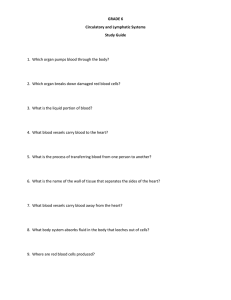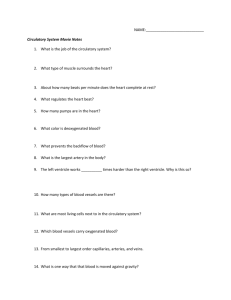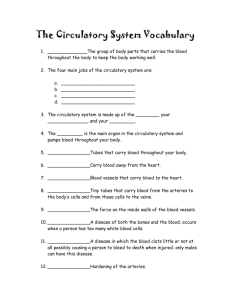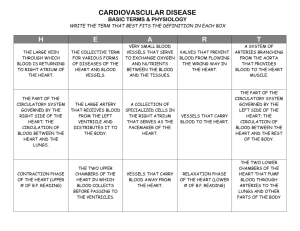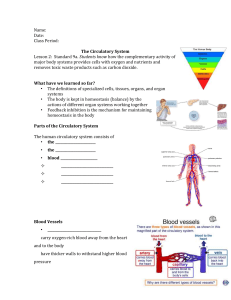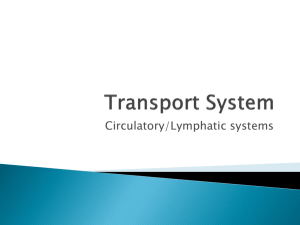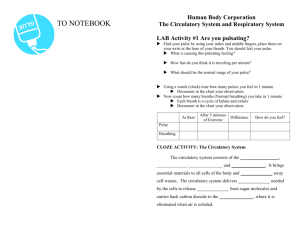Human Body Systems: The Circulatory System
advertisement
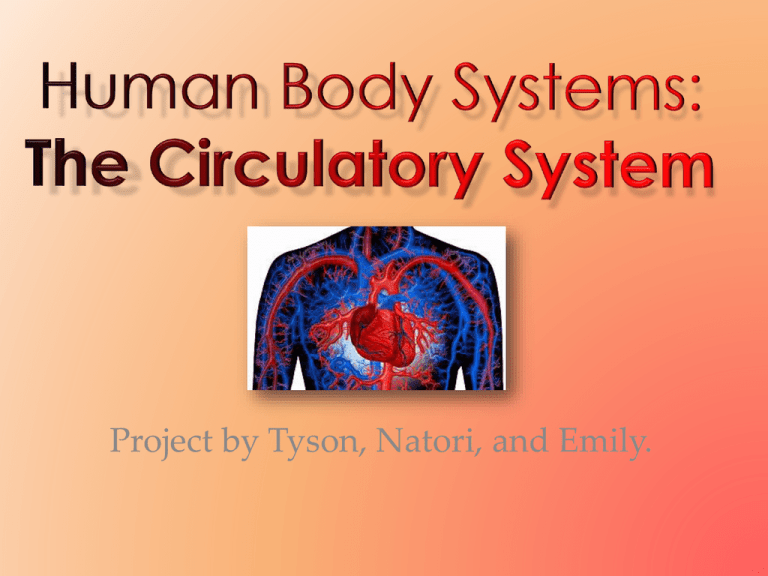
Project by Tyson, Natori, and Emily. What is the circulatory system and what does it do? The circulatory system, also called the cardiovascular system, is a vital organ system in the human body composed of the heart, blood, and blood vessels. This body system circulates blood throughout the body. Blood carries red blood cells, which carry oxygen, and oxygen is needed for the body to survive. White blood cells are also carried by blood but white blood cells fight bacteria. This places them in the immune system. Also, the blood carries nutrients for the body. Nutrients help the body live and grow. The heart The heart is considered what the system centers around even if each of the parts of the circulatory The Parts of the circulatory system system all play a huge part in oxygenating the body. The heart is about the size of your fist and it’s the strongest part of your body. It is a very muscular organ with valves so there is only one-way blood flow. The heart squeezes repetitively to “pump” blood through your blood vessels. The human heart Blood Blood is a big part of the circulatory system. It is a liquid that transports important things around the body like oxygen and nutrients. The name “circulatory” comes from the fact the the system circulates blood through the body. The main components of blood are plasma, white blood cells, and red blood cells. Plasma is a liquid and it’s the reason that blood flows. Plasma also carries nutrients and white blood cells. Red blood cells carry oxygen, then go to the lungs to get oxygen and then go somewhere to use it. White blood cells protect the body from bad bacteria and viruses. This picture is of red blood cells. Plasma is the liquid they are in. Blood vessels Blood vessels carry blood to and from the heart. Thickwalled arteries carry oxygen filled blood from the heart and veins take the oxygen-depleted blood back. Arteries have muscles to move blood through your body and veins have valves that keep blood from going the wrong direction. Capillaries are blood vessels so tiny that the red blood cells have to line up single file to pass through. Capillaries do not push the blood itself, but the blood is pushed by pressure behind it. Blood vessels. Oxygen-depleted blood is not blue, but is a darker red. It often show up blue through your skin. Visuals like this use blue for contrast. If the body needs oxygen to function and move, so if you were moving more, you would probably need more oxygen. So your heart would pump harder to get you more, right? Let’s test that. People who didn’t volunteer: Sit down, count your pulse (15 seconds) , don’t get in anyone’s way, and try not to laugh too hard. Those who volunteered: Do jumping jacks until the timer rings. (15 seconds.) Then count your pulse for 15 seconds. We will set a timer 15 seconds twice. The first time, nonvolunteers count. Then volunteers exercise. The second 15 seconds, volunteers count. What was your result? Basically, everyone should get a different number of beats per minute. Heart rate can be changed by height, muscle mass, fitness, food, medication, and endless other factors. Generally, those who did the exercise should have gotten higher heart rates. Usually fitter people get lower BPMs, but as earlier stated, another factor can easily affect that. Answer these questions: (1-3 sentences would do) 1. What was your result in BPM? 2. Why do you think you got that result? 3. What do you think the circulatory system’s most important part is? Blood or the heart? Bibliography http://www.innerbody.com/image/cardov.html http://learn.fi.edu/learn/heart/vessels/vessels.ht ml Google images We hope you liked our presentation!
